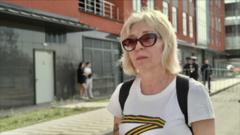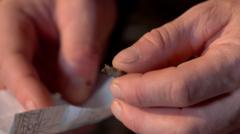This year marks a significant moment in Russian history, blending remembrance of WWII with modern military operations, as ceremonies and narratives reflect on the past while facing present realities.
Rethinking Memory: Russians Commemorate WWII Amidst Modern Conflict

Rethinking Memory: Russians Commemorate WWII Amidst Modern Conflict
As Russia prepares for the 80th anniversary of its WWII victory, a deep connection to past struggles underscores current military actions perceived as a continuation of history.
In the Russian town of Dubna, a historical re-enactment captures an iconic moment from WWII as explosions and gunfire echo, mimicking the final battle for Berlin in 1945. This dramatization is part of numerous events commemorating the 80th anniversary of the Soviet Union's victory over Nazi Germany, a pivotal part of Russian national pride known as The Great Victory.
Among the spectators is a woman named Katya, who reflects on her family’s history in the war. Her grandfather went missing during the conflict, a legacy that now intertwines with her son’s current service in Ukraine. "My son is in a war now, he volunteered. I tried to talk him out of it, but he hasn’t listened," she shared.
The stark contrast between the battles from past and present brings forth a complex narrative. In WWII, Soviet soldiers fought to liberate their homeland from Nazi invasion, a struggle marked by the loss of over 27 million citizens in what is viewed as the Great Patriotic War. Today, however, Russia is embroiled in its own military campaign in Ukraine, branded by the Kremlin as a “special military operation.”
As the conflict unfolds, a propaganda narrative emerges, portraying Russia as a victim combating a modern-day form of fascism, paralleling historical struggles against Nazism. This nationalistic rhetoric is bolstered by state media which promotes the idea that Russia is once again standing against Europe’s aggression.
Andrei Kolesnikov, a columnist, pointed out that the significance of WWII victory is integral to the Russian collective consciousness, serving as “the glue for the nation” across different political eras. However, he notes a new twist in the narrative, where the current conflict is framed as a continuation of WWII against ‘Eurofascism.’
Television plays a critical role in shaping these perspectives, with programming often glossing over historical complexities, such as the 1939 non-aggression pact between Stalin and Hitler, focusing instead on external threats. A prominent talk show host recently lambasted German leaders for their support for Ukraine, igniting national sentiment by recalling the immense Soviet sacrifices during the war.
Monuments across Russia further illustrate this merging of past and present, such as a newly revealed statue in Khimki featuring a WWII soldier alongside a contemporary Russian soldier, symbolizing the ongoing struggle. Reminders of The Great Victory punctuate daily life, from specially decorated trains in the Moscow metro to newborns dressed in military attire.
As preparations ramp up towards the annual Victory Day parade on May 9, the Kremlin is keenly aware of security needs, especially following Ukrainian drone attacks targeting Moscow. Leaders from multiple countries are set to attend, showcasing Russia's military prowess while cementing the holiday's significance.
The echoes of history resonate with individuals like 98-year-old veteran Fyodor Melnikov, who remembers the pain of loss as he reflects on his brother’s sacrifice. His poignant words about his brother serving in the war reveal a desire for peace—“People should be allowed to live freely.”
As all of Russia commemorates the anniversary of The Great Victory, it remains a moment for reflection—a time to remember not only the triumphs but also the heavy toll of war on families and the nation as a whole.




















